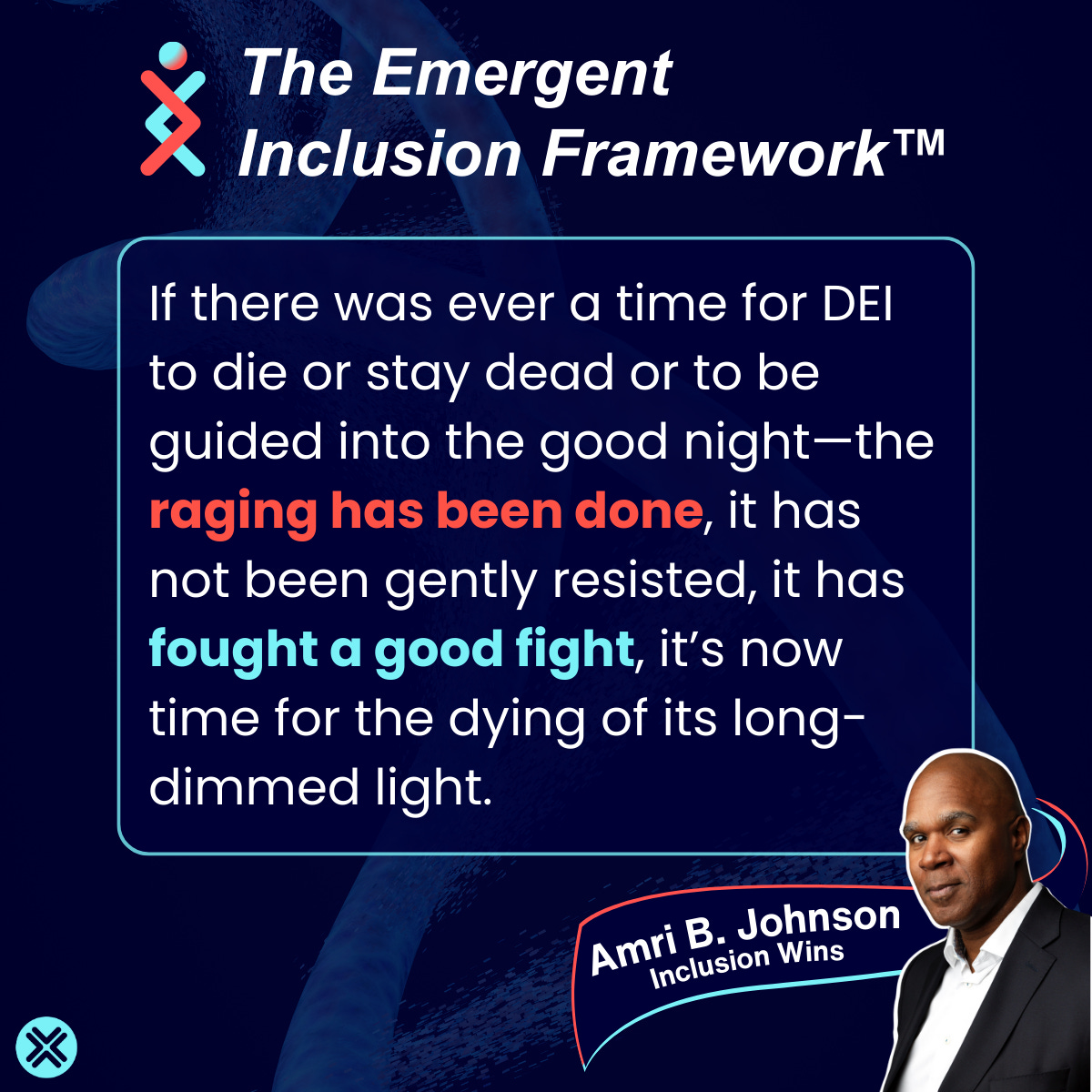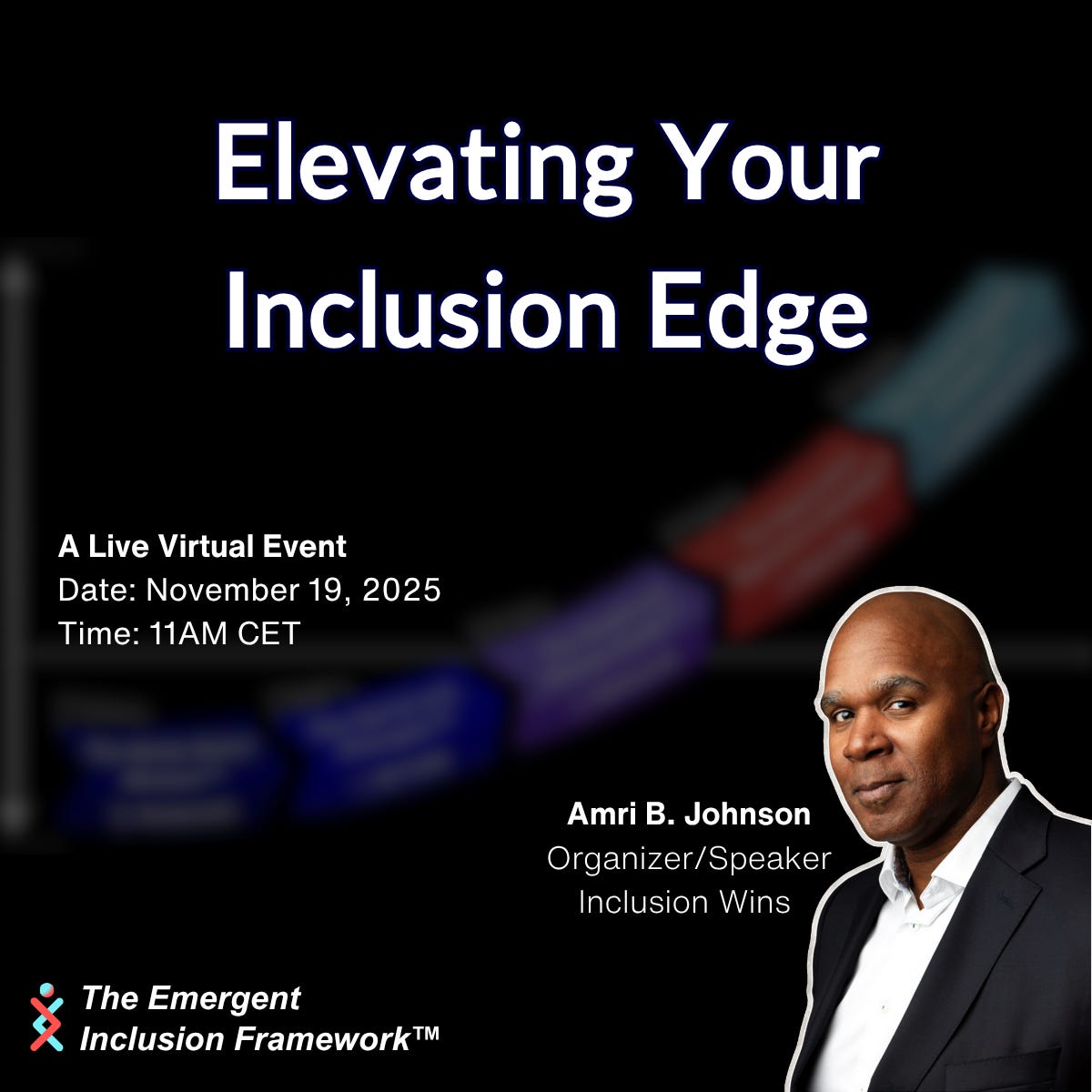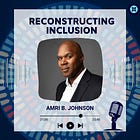Why I'm Sticking With “Inclusion” (And What That Actually Means)
What does it say for one to abandon a timeless and well-regarded idea due to silly political shuffling?
A colleague recently asked me about changing the name of one of our products—Inclusion Systems 360, formerly the Systemic Inclusion Survey. The new name better reflects what we’ve been working with companies to do for quite some time: take a snapshot of organizational inclusion.
But that’s not what this is about.
He suggested that I change the name of the tool, the name of what I do, to something that doesn’t signal “inclusion.” He’s outside the industry, brilliant at what he does. Here’s what struck me: he said every time he hears “inclusion,” what registers in his head is “exclusion.”
That’s the dynamic I’ve been sitting with. Because right now, in this moment of what I’d call draconian policy shifts, I’m watching some people scramble to rebrand, retreat, or double down on the very approaches that got us here while trying to make it “sound” different.
What does it say for one to abandon a timeless and well-regarded idea due to silly political shuffling? If the way a person is practicing inclusion or more so saying the three letters ‘DEI’ as that is the current equivalent of saying “Lord Voldemort” in Harry Potter lore or saying the name of “Bettlejuice” (from the film) three times how is sense to be made of it?
If DEI’s name is changed and orthodox ineffective practices remain the same = Old wine. New wineskins. . .Still old (stale) wine.
The Great Renaming
So many folks have been changing their titles. Chief Diversity Officers becoming Heads of Employee Experience. DEI leaders rebranding as Engagement and Development Leads, Opportunity Strategy Managers, Heads of People and Culture, Executives for Inclusive Leadership.
I’ve seen: Welcoming Workplace. Talent Management and Development Lead. Chief Inclusion and Belonging Officer. The list goes on.
I was once Head of Cultural Intelligence and Inclusion myself.
And it always made me wonder: What did that title mean? Why did it matter? How did I embody it?
These aren’t rhetorical questions. They’re the questions we should all be asking ourselves right now—not whether to change our titles, but whether we know what the hell we’re talking about in the first place.
What It Meant
To me, it meant creating the conditions for everyone to thrive and building a set of skills within the range of cultural intelligence: understanding and deepening context, making sense and sense-making with colleagues, being able to adapt, and understanding who people are—not just what they are.
Identity matters, but not just because of the one you can see. Identity matters because it informs how we do things, how we see the world, and how we engage with it. We need to reflect on identity, but not to reduce it.
That was the whole idea: creating the conditions, helping people understand and build these skills over time.
Why It Mattered
It mattered because we had a lot of smart people at my workplace. All the companies I work with have a lot of smart people, and that, in turn, makes it clear that intelligence is incomplete in itself. It’s not enough—especially in the age of large language models and AI, where we’ll have access to information very fast (despite occasional hallucinations).
How are we making sense of it? How do we actually learn faster than our competitors? How do we make breakthroughs that AI by itself can’t make? That requires humans.
I embodied my role by enrolling and engaging everybody in the organization. I made the work accessible so people understood how it fit into their everyday work life. Even the skeptics, like a seemingly grumpy computational chemist who became one of inclusion’s biggest supporters while I worked inside a pharmaceutical company.
I made it actionable because it wasn’t just slogans and—as my colleague, Jonathan Ashong-Lamptey often says, “food, fun, and flags.”
It wasn’t just about people feeling good. It was about people being their best selves and contributing to the organizational mission. It was aligned with the organizational raison d’être. So it had staying power. It was sustainable.
That’s what it meant to me. That’s how I embodied it. I made it clear how it mattered to everyone.
And just like then, I remain focused on inclusion. I’ll continue to do so because my brand, my company name, my book—they’re all related to that. And, just because some silly opportunists decide to make their name and their coin on being anti-DEI activists (that don’t want DEI to go away) doesn’t warrant me abandoning what the majority of people in companies desire–conditions created for them to do their best work and a willingness by everyone to do so for one another.
Diversity and Inclusion Definition
The Challenge—and Why Reaction Isn’t the Answer
I know this is a challenge. A big one.
I’ve seen people who framed their work over the past few years—particularly since 2020, post-George Floyd—anchor their identity to fighting for social justice. And now, with the current American government’s policies, many are pivoting back to post-Floyd, Kendi-like How to Be an Antiracist rhetoric and knee-jerk reactions.
They’ve been watching these behaviors by the current U.S. administration and automatically saying, “See, we were right. We should have gone harder. We’ve got to keep doing what we were doing.”
But that’s off the mark.
Thomas Sowell, in Social Justice Fallacies, offers a frame worth sitting with:
“The passionate commitment to social justice is no substitute for knowing what the hell you’re talking about.”
I’m not accusing people of not knowing what they’re talking about. But in too many cases, people jumped into this work without fully understanding or digging into the notion of organizational complexity. They operated from passion without process, from identity without depth of inquiry.
Look, it’s understandable. But pivoting back to the stance many took—often rooted in DiAngelo and Kendi—in reaction to government acts (who also reacted to practices that were happening back then)? It wasn’t helpful, and it didn’t work then.
It won’t advance fairness in organizational life, now. It will not. In fact, I believe it will make it worse.
What Justice Actually Requires
Sowell says something else that deserves our attention:
“The word ‘justice’ is often used loosely to mean a need or desire or seeking something as a just wage or a just society. But that’s not the same as justice in the sense of a universal and impartial process of determining claims and meting out punishment or rewards.”
This distinction matters. In so many cases, what we think is a solution to injustice is filled with trade-offs we can’t reconcile—even with the people we want to be in solidarity with.
Don’t get me wrong: the right to exercise speech passionately as an individual, or in contribution to organized, principled insubordination, is something I will always applaud and respect. Even when I might disagree with the cause, do this by all means. We absolutely need it. What’s happening right now is, for lack of a better way to say it without raising my cortisol levels, very much uncool and not going to be helpful to many people.
We need to protest. We need resistance.
But where the world of work is concerned? The reactionary approach to social justice today is no more viable than the outcomes of the past.
What We Actually Need
We need the protest. But what we need more are universal and impartial processes—as Sowell said—that must be designed into an organization and its systems and structures.
From strategy to structure. Process to people. Experience to rewards. The “how we do things around here” that is interdependent with what we do.
Let me say that again: the how we do things around here that is interdependent with what we do.
A culture of inclusion is one that’s co-created. It’s the responsibility of everyone. Just like “justice” is for all, inclusion—if we’re going to adopt this approach implicitly or explicitly—must be a belief expected to be manifested via behaviors.
Otherwise, it will operate as a frame for contention, apathy, and in too many cases, like we’ve seen with the ideological capture of DEI (by those who consider themselves advocates as well as adversaries), it will lead to division.
I’m Sticking With Inclusion
Let me reiterate: I’m sticking with inclusion, and I don’t care what one chooses to call it.
It is, and always has been, about creating the conditions for people to thrive, to matter and belong, while contributing their best to the organizational mission—whatever organization they might be a part of now or in the future.
When I talk about everyone contributing, I mean everyone is an operator of your organization’s inclusion system, because that system is closely tied to your organizational culture.
That’s it.
Two Things Before I Close
One: Elevating Your Inclusion Edge, our live virtual event, November 19th at 11 a.m. Central European time. I’ll be talking about the elements of Emergent Inclusion and how the Emergent Inclusion Framework is a path forward for you and your organization to make inclusion normal—a way of being that creates the conditions for everybody to thrive.
Two: The Emergent Inclusion Pathway is a comprehensive six-module online course that helps practitioners embed inclusion as a core organizational principle rather than a set of isolated initiatives. Through practical tools and frameworks, participants learn to shift beliefs, develop cultural intelligence, build relational fitness, and create sustainable change—moving inclusion from events and trainings to an emergent element fully integrated with organizational systems and embedded in daily operations.
This self-paced course includes video lessons, workbook exercises, the Reconstructing Inclusion eBook, and a live dialogue with me and fellow coursemates.
If you’re interested to learn more, drop me a DM or comment in this post. We’ll let you know when the course fully launches.
I hope this was helpful. Make it a great day. ✌🏼









100% agree Amri. A stand worth taking.
It's not the word. It's the misuse of it and the misunderstanding of how to make it happen.
It's like a car company who releases a model that is a total lemon and tries to fix the problem by changing the model's name rather than what's wrong with the car.
Doesn't make anything better. Just gives the critics one more thing to be critical about.
I really appreciate your dedication to the conservation of the meaning of words. Just because someone misuses or misunderstands, does not mean we should abandon language as it's meant to be used.